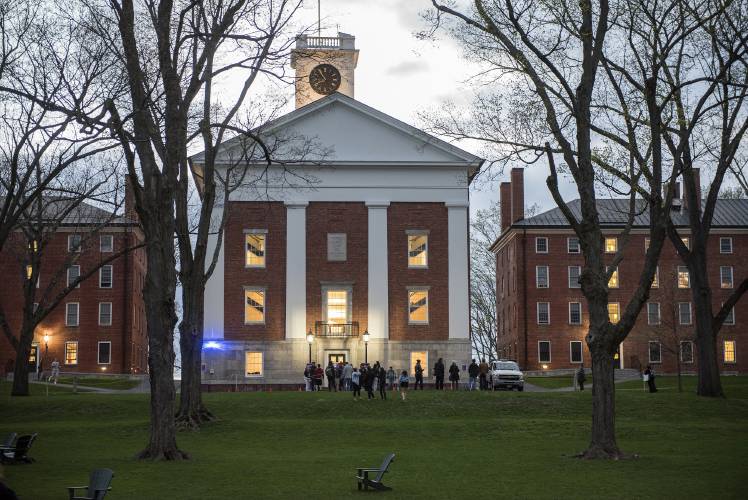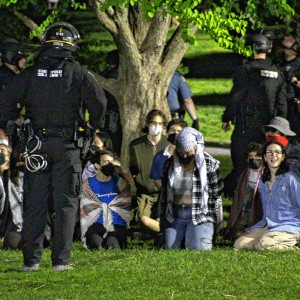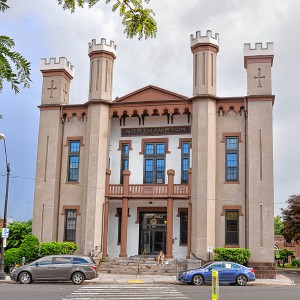30% of profs call for Amherst College to divest from firms making money from Gaza campaign

Johnson Chapel on the Amherst College quad. STAFF FILE PHOTO
|
Published: 12-12-2023 4:58 PM
Modified: 12-12-2023 6:21 PM |
AMHERST — A call for Amherst College to divest from companies that could be making money off the Israel-Hamas war is being issued by 60 faculty members, who contend in a letter that Israel’s military response to the Oct. 7 Hamas attack violates international humanitarian law and constraints on a just war.
The academics sent the two-page letter to President Michael Elliott and members of the trustees on Dec. 4.
“In our view, the destruction of Gazan civil society and innocent life over the past six weeks must be inconsistent with Amherst’s values,” reads the letter, drafted by Alexander George, the Rachel and Michael Deutch Professor of Philosophy at Amherst College. “We call upon the Trustees not to allow Amherst College to support or invest in corporations or other entities that directly profit (to be defined as the Trustees see fit) from the ongoing Israeli military operations that are laying Gazan life and society to waste.”
George said he wrote the letter and circulated it to colleagues, with about 30% of the faculty signing it, before it was delivered to the college president and trustees.
The letter begins by stating that “Hamas carried out a morally heinous attack that left well over a thousand innocents dead in Israel” and continues by observing that Israel then led a siege and bombing campaign which “is itself a moral catastrophe” that has killed over 10 times as many innocent Palestinians in Gaza.
Footnotes are used throughout the letter, including citing a Washington Post article that one out of every 200 Gazans has been killed, and a United Nations report that “67% of the more than 14,000 people killed in Gaza are estimated to be women and children.”
A response to the letter came from Elliott, George said, who told him the letter was thoughtful, deserved a thoughtful response, and that trustees would need time to discuss it.
The college, though, is declining public comment on the letter at this time, said Caroline Hanna, a college spokeswoman.
Article continues after...
Yesterday's Most Read Articles
 More than 130 arrested at pro-Palestinian protest at UMass
More than 130 arrested at pro-Palestinian protest at UMass
 ‘Knitting treasure’ of the Valley: Northampton Wools owner spreads passion for ancient pastime
‘Knitting treasure’ of the Valley: Northampton Wools owner spreads passion for ancient pastime
 UMass student group declares no confidence in chancellor
UMass student group declares no confidence in chancellor
 Guest columnist Josh Silver: Northampton school budget — Let’s start with kindness, accuracy and respect
Guest columnist Josh Silver: Northampton school budget — Let’s start with kindness, accuracy and respect
 With Jones project in question, Amherst won’t sign lease for temporary digs
With Jones project in question, Amherst won’t sign lease for temporary digs
 UMass graduation speaker Colson Whitehead pulls out over quashed campus protest
UMass graduation speaker Colson Whitehead pulls out over quashed campus protest
Divestment related to actions by countries has precedent at the college, George said. He pointed to a decision by trustees nearly 18 years ago related to Sudan.
In January 2006, trustees voted to divest from “multinational companies identified as having direct business ties to the Sudanese government or companies whose business activities are in direct support of these companies and the activities of the government.”
No direct investments were held by trustees at that time.
But that resolution also noted that “a divestment action should be considered rarely and only in the face of human atrocities that are wholly inconsistent with the moral and ethical values of Amherst College.” In that case, trustees found “clear and mounting evidence that the government of Sudan is committing genocide against the people of its Darfur region.”
The Dec. 4 letter from faculty also appreciates that a state has a right and duty to keep its citizens safe. “However our views may differ about the longstanding conflict in the Middle East, we are united in our judgment that present Israeli military actions in Gaza are morally abhorrent.”
The letter follows one in which more than 100 Five College scholars joined more than 1,000 higher education educators from across New England asking the U.S. senators for the six states to support a permanent cease-fire in Gaza. At the time in early December, 21 Amherst College professors had signed on to that letter, which also called for the peaceful release of Israeli hostages and arbitrarily detained Palestinians, and for a U.N. peacekeeping force to be deployed to the occupied Gaza Strip, West Bank and East Jerusalem.
Scott Merzbach can be reached at smerzbach@gazettenet.com.

 Valley lawmakers seek shorter license for FirstLight hydropower projects
Valley lawmakers seek shorter license for FirstLight hydropower projects State Senate budget funds free community college for all
State Senate budget funds free community college for all ‘We can just be who we are’: Thousands show support for LGBTQ community at Hampshire Pride
‘We can just be who we are’: Thousands show support for LGBTQ community at Hampshire Pride Doors open at Tilton Library’s temporary home at South Deerfield Congregational Church
Doors open at Tilton Library’s temporary home at South Deerfield Congregational Church
